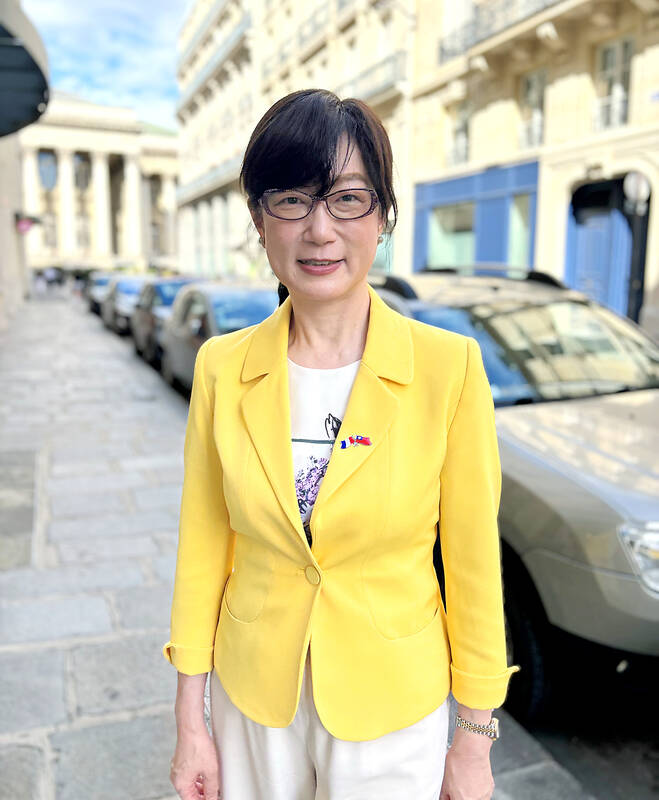New Representative to France Hao Pei-chih (郝培芝) said she would open up more space on the international stage through economic, trade and technology diplomacy based on the foundation laid by her predecessor, Francois Wu (吳志中).
Hao, the nation’s first female representative to France, made the remarks in a media interview on Sunday on the sidelines of an event organized by the Overseas Community Affairs Council.
The former head of the Civil Service Protection and Training Commission assumed her new position on Sept. 1 to fill the vacancy left by Wu, who became deputy minister of foreign affairs last month.

Photo: CNA
Hao said she was feeling a lot of pressure starting the new job, but later found great support from the compatriot communities and colleagues at the representative office in France.
Lauding Wu for having achieved several significant breakthroughs between Taiwan and France, as well as his mastery of French in mainstream media appearances, Hao said her predecessor had elevated Taiwan’s visibility in French society during his tenure.
“Now everyone knows Taiwan and has a very positive perception of Taiwan,” she said.
“Ambassador Wu has set a high threshold. He is a legend and a ceiling. He has performed so well that anyone who follows him will have difficulty” reaching the threshold, she said.
As his successor, Hao said she would continue to expand the room for Taiwan in the diplomatic arena.
Asked about the future direction she will take in promoting Franco-Taiwanese relations, Hao said she would further promote “economic, trade and technological diplomacy.”
While all aspects of France and China are based on diplomatic relations, France knows that Taiwan is an important cooperative partner and it has adopted a “parallel treatment” policy and attitude in many areas toward the two sides across the Taiwan Strait, she said.

US President Donald Trump said "it’s up to" Chinese President Xi Jinping (習近平) what China does on Taiwan, but that he would be "very unhappy" with a change in the "status quo," the New York Times said in an interview published yesterday. Xi "considers it to be a part of China, and that’s up to him what he’s going to be doing," Trump told the newspaper on Wednesday. "But I’ve expressed to him that I would be very unhappy if he did that, and I don’t think he’ll do that," he added. "I hope he doesn’t do that." Trump made the comments in

NOT AN OPENING: Trump’s violation of international law does not affect China’s consideration in attacking Taiwan; Beijing lacks capability, not precedent, an official said Taiwanese officials see the US’ capture of the president of Venezuela as a powerful deterrent to Beijing’s aggression and a timely reminder of the US’ ability to defeat militaries equipped with Chinese-made weapons. The strikes that toppled Venezuelan President Nicolas Maduro signaled to authoritarian leaders, including Chinese President Xi Jinping (習近平), US President Donald Trump’s willingness to use military might for international affairs core to US interests, one senior official in Taipei’s security circle said. That reassured Taiwan, the person said. Taipei has also dismissed the idea that Trump’s apparent violation of international law could embolden Beijing, said the official, who was not

A cold surge advisory was today issued for 18 cities and counties across Taiwan, with temperatures of below 10°C forecast during the day and into tonight, the Central Weather Administration (CWA) said. New Taipei City, Taipei, Taoyuan and Hsinchu, Miaoli and Yilan counties are expected to experience sustained temperatures of 10°C or lower, the CWA said. Temperatures are likely to temporarily drop below 10°C in most other areas, except Taitung, Pingtung, Penghu and Lienchiang (Matsu) counties, CWA data showed. The cold weather is being caused by a strong continental cold air mass, combined with radiative cooling, a process in which heat escapes from

Snow this morning fell on Alishan for the first time in seven years, as a strong continental cold air mass sent temperatures plunging across Taiwan, the Central Weather Administration (CWA) said. The Alishan weather station, located at an elevation of about 2,200m in central Taiwan, recorded snowfall from 8:55am to 9:15am, when the temperature dropped to about 1°C, the CWA said. With increased moisture and low temperatures in the high-altitude Alishan area, the conditions were favorable for snow, CWA forecaster Tsai Yi-chi (蔡伊其) said. The last time snow fell at the Alishan weather station was on Jan. 10, 2018, while graupel fell there